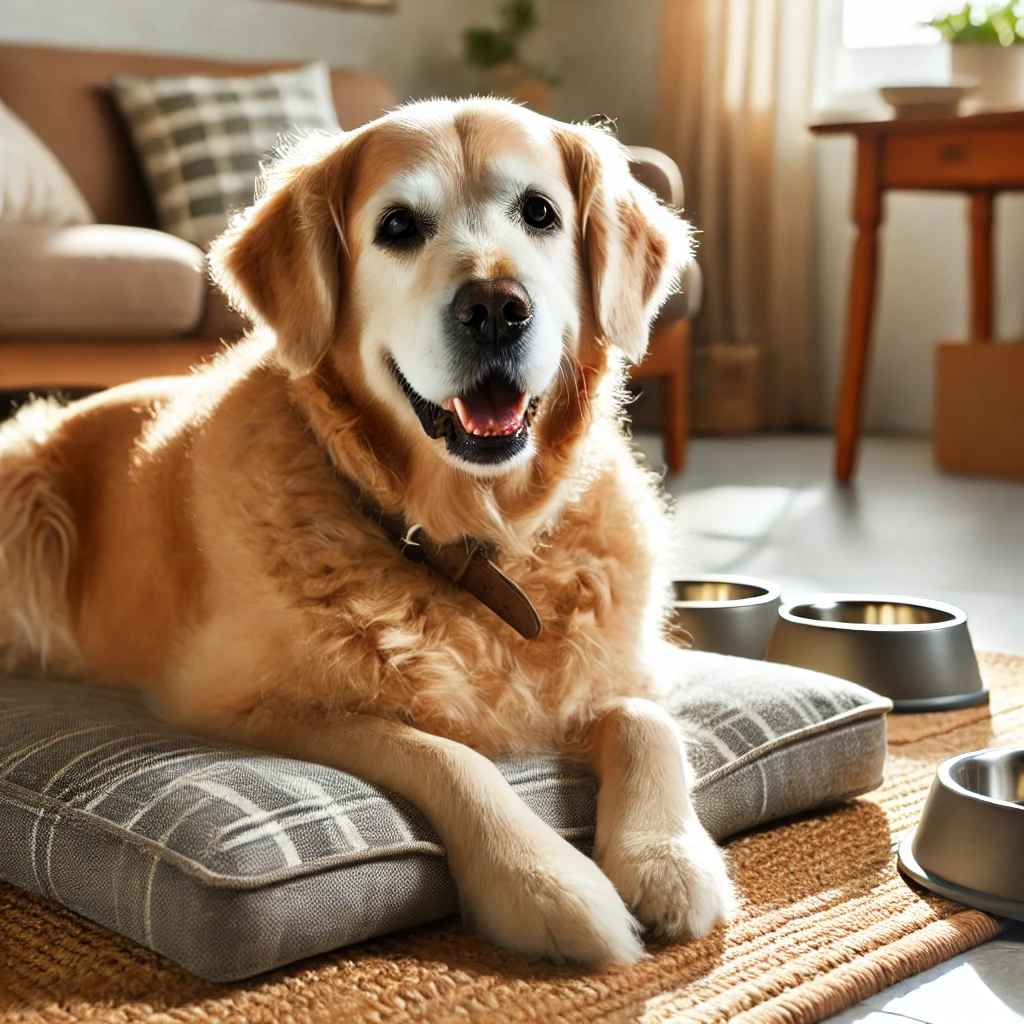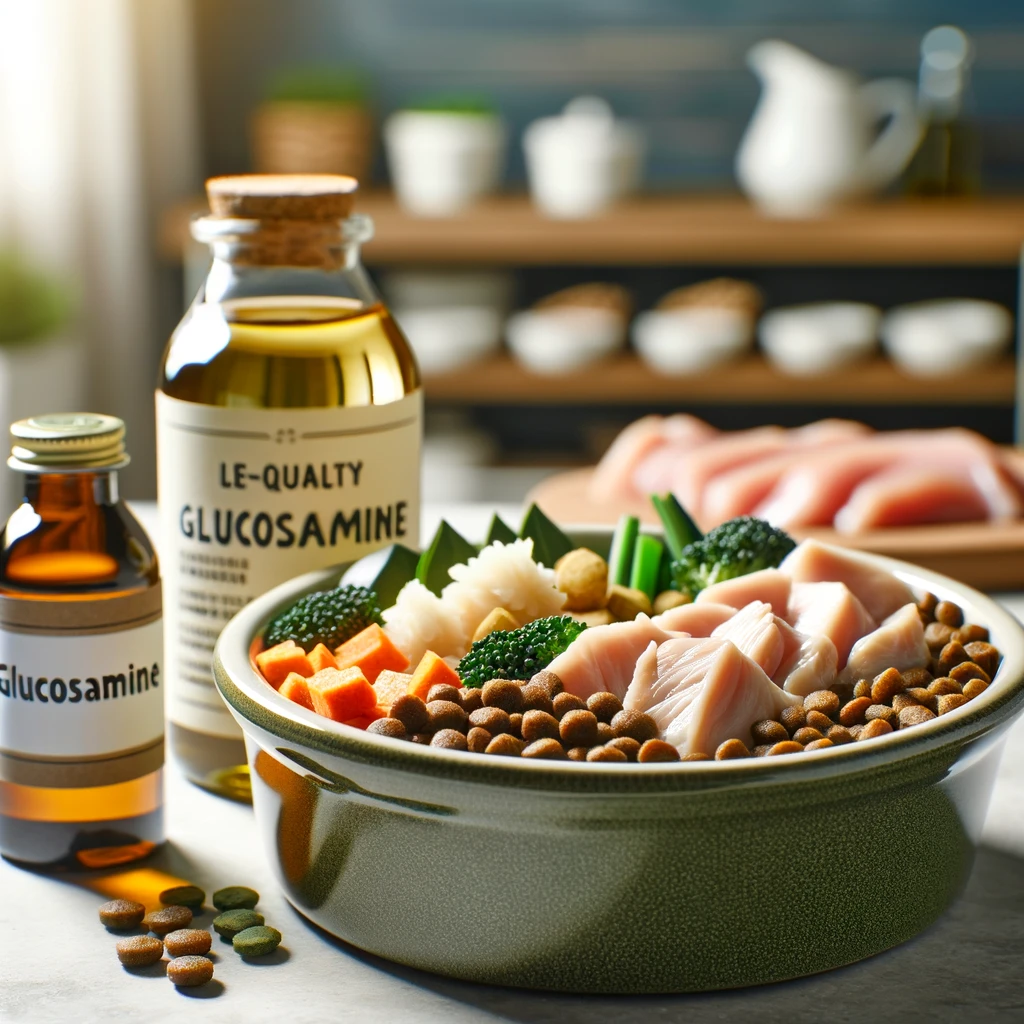As our beloved dogs age, they require extra care and attention to ensure they remain happy and healthy. Senior dogs, typically those aged seven years and older, have different needs than younger pups. From nutrition and exercise to holistic therapies and supplements, this comprehensive guide will help you provide the best care for your ageing canine companion.
1. Nutrition for Senior Dogs
A well-balanced diet is crucial for maintaining your senior dog’s health. As dogs age, their metabolism slows down, making them more prone to weight gain and digestive issues. Here are key nutritional considerations:
Choosing the Right Food
High-quality protein: Maintains muscle mass and strength. Opt for lean meats like chicken, turkey, or fish, and avoid overly processed meats with preservatives.
Healthy fats: Omega-3 fatty acids (found in fish oil and flaxseed) support joint health, reduce inflammation, and boost cognitive function. Healthy fats also contribute to a shinier coat and overall skin health.
Fibre: Aids digestion, promotes gut health, and prevents constipation. Good sources include pumpkin, sweet potatoes, and brown rice, which also provide essential vitamins and minerals.
Joint-supporting ingredients: Glucosamine, chondroitin, and MSM (methylsulfonylmethane) help protect cartilage and improve mobility, reducing the risk of stiffness and arthritis-related pain.
Adequate hydration: Senior dogs are prone to dehydration, so ensure fresh water is always available. Wet food can also help increase moisture intake, especially for dogs who are reluctant to drink water frequently.
Special Diets for Senior Dogs with Health Conditions
For arthritis: Anti-inflammatory foods like turmeric, blueberries, and green-lipped mussels help ease joint pain and support mobility.
For kidney disease: A diet low in phosphorus and protein helps manage kidney function. Fresh vegetables like carrots and green beans can be included as low-phosphorus snacks.
For heart health: Low-sodium diets with taurine and L-carnitine support cardiovascular function, reducing the risk of heart disease.
For cognitive decline: Antioxidants, DHA, and medium-chain triglycerides (found in coconut oil) enhance brain function and improve memory retention.
2. Exercise and Mobility
While senior dogs may slow down, regular exercise remains crucial. Activities should be adjusted to accommodate their ageing bodies:
Gentle and Effective Exercises
Daily walks: Maintains joint flexibility, circulation, and mental stimulation. Keep walks shorter but more frequent to prevent overexertion.
Swimming: A low-impact workout that reduces stress on joints while improving cardiovascular health and muscle strength.
Stretching and gentle massage: Keeps muscles flexible and reduces stiffness, preventing discomfort and increasing relaxation.
Interactive toys and puzzles: Prevent cognitive decline by providing mental stimulation, encouraging problem-solving skills, and keeping your dog engaged.
Signs Your Senior Dog May Need Mobility Support
Difficulty standing up or lying down
Limping or reluctance to walk
Slipping on smooth floors
Hesitation to climb stairs or jump onto furniture
Stiffness after resting or napping
Consider adding non-slip rugs, orthopaedic dog beds, and pet ramps to improve mobility and comfort. You can also use heated pads or blankets to soothe stiff joints during colder months.
3. Supplements for Senior Dogs
Adding supplements to your senior dog’s diet can alleviate common age-related issues:
Glucosamine and chondroitin: Improve joint health and reduce arthritis symptoms, maintaining mobility and reducing discomfort.
Omega-3 fatty acids: Support heart health, brain function, and a shiny coat while reducing inflammation.
Probiotics and digestive enzymes: Aid digestion, enhance nutrient absorption, and strengthen the immune system, promoting gut health.
CBD oil: May help with pain relief, inflammation, and anxiety, promoting relaxation and overall well-being.
Multivitamins: Fill nutritional gaps and support overall well-being, ensuring your dog gets essential nutrients even with dietary restrictions.
4. Holistic Therapies for Ageing Dogs
Holistic treatments can complement traditional veterinary care and improve your dog’s quality of life.
Alternative Treatments to Consider
Acupuncture: Helps with pain relief, mobility issues, and arthritis symptoms by stimulating natural healing responses.
Massage therapy: Enhances circulation, relaxes muscles, and reduces stiffness, leading to increased comfort.
Chiropractic care: Aids spinal alignment, improving mobility and reducing pain associated with ageing-related posture changes.
Herbal remedies: Herbs like turmeric, Boswellia, and milk thistle have anti-inflammatory and liver-supporting properties.
Aromatherapy: Essential oils like lavender and chamomile can help with anxiety, stress relief, and relaxation.
5. Extra Care for Senior Dogs
As dogs age, they require additional support to ensure they remain comfortable and happy.
Veterinary Care
Regular check-ups: Bi-annual vet visits help catch and manage health issues early, improving treatment outcomes.
Dental care: Regular brushing and professional cleanings reduce the risk of infections, bad breath, and gum disease.
Vaccinations and parasite control: Older dogs may have weaker immune systems, making disease prevention through vaccines and flea/tick control crucial.
Home Adjustments for Comfort
Orthopaedic bedding: Supports joints and improves sleep quality, preventing pressure sores.
Non-slip flooring: Prevents slipping and injuries, especially in dogs with arthritis.
Raised food and water bowls: Reduce strain on the neck and joints, making mealtime more comfortable.
Pet ramps and stairs: Assist with getting onto furniture or into the car without putting extra strain on joints.
Grooming and Hygiene
Brushing: Keeps their coat healthy, reduces shedding, and prevents matting, especially for long-haired breeds.
Nail trimming: Prevents overgrowth that can cause discomfort and difficulty walking, reducing the risk of falls.
Ear cleaning: Prevents infections, particularly in floppy-eared breeds prone to ear issues.
Emotional and Mental Well-Being
Consistent routine: Older dogs thrive on routine, so keep feeding, exercise, and sleep schedules consistent to reduce stress.
Gentle socialisation: Continue introducing them to new people and environments at a comfortable pace to keep them engaged.
Lots of love and attention: Older dogs need extra affection to feel secure, happy, and emotionally fulfilled.
Caring for a senior dog requires patience, love, and dedication. By focusing on proper nutrition, appropriate exercise, supplements, holistic therapies, and, of course, plenty of love, you can ensure your ageing furry friend enjoys their golden years with comfort and happiness. Regular veterinary check-ups, home adjustments, and emotional support will keep your senior dog thriving for years to come.


Summary of Key Insights
1. How can I tell if my dog is a senior?
Dogs are generally considered seniors at around 7 years old, though this varies by breed. Larger breeds age faster than smaller ones. Signs of ageing include greying fur, reduced energy, joint stiffness, and slower metabolism.
2. What is the best food for senior dogs?
A diet rich in high-quality protein, omega-3 fatty acids, fibre, and joint-supporting ingredients like glucosamine and chondroitin is best. If your senior dog has specific health issues, consult your vet for a tailored diet.
3. How much exercise does a senior dog need?
Older dogs still need daily movement, but in a gentler form. Shorter walks, swimming, and stretching help maintain mobility. Avoid high-impact activities that strain joints.
4. What supplements should I give my senior dog?
Some key supplements include:
Glucosamine & Chondroitin (for joint health)
Omega-3 Fatty Acids (for brain & heart function)
Probiotics (for digestion)
CBD Oil (for pain & anxiety relief)
5. How often should senior dogs see the vet?
Older dogs should have bi-annual check–ups to catch any age-related issues early, including arthritis, heart disease, and dental problems.
6. How can I make my home more comfortable for my senior dog?
Use orthopaedic dog beds for joint support
Place non-slip rugs to prevent falls
Use raised food & water bowls to reduce neck strain
Install pet ramps to help them get onto furniture or into the car

